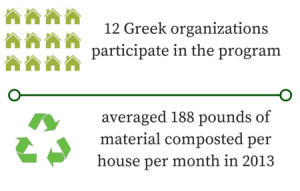Eco-friendliness on campus is on the rise with the institution of Greek Eco-Reps — a network of students involved with Greek life dedicated to making their houses greener. The program, created by Lehigh’s Office of Sustainability, aims to improve green practices in participating Greek houses, while teaching important lessons about sustainability.
Maria Cuenca, ’15, is a student employee in the Office of Sustainability. As both a sorority member and an environmental engineering major, her passion for sustainability has led her to take an important position in overseeing this new program, as a Greek Eco-Rep coordinator.

(Emily Okrepkie/Made with Canva)
Her responsibility is to visit and evaluate each participating chapter house individually, in inspections known as “house audits,” to determine what specific environmental problems needs to be addressed and what members of each house can do to improve. Then, she meets weekly with the houses’ Eco-Reps, checking in on their progress and advising them on any issues they may face. Cuenca said it’s often necessary to customize, as each house is unique.
“We make a plan tailored to each house, because each house is different in terms of the changes they need to make,” Cuenca said.
The Greek Eco-Reps system is an offshoot of the Eco-Rep Leadership Program, an initiative formed in 2011 with similar goals, which was originally limited to Lehigh residence halls. Cuenca said it’s difficult to compare the potential for sustainable practices in a Greek house to that of a dorm. She said efforts made by those living in residence halls are essentially limited to their dorm rooms. However, Greek houses tend to have a different dynamic.
“(In a Greek house), you’re a part of a group that has decided to do something together,” Cuenca said.
Another student employee and Eco-Rep coordinator, Dana Pierce, ‘18, agreed. She said that in Greek houses, members take pride in the facility, so they want to make the house a greener space.
Melissa Zirps, ‘18, the Eco-Rep for Alpha Phi, said her many duty is to manage the composter. Four of Lehigh’s Greek houses utilize composters, which are designed to accelerate the decomposition of compatible waste. Capable of diverting large amounts of waste from traditional trashcans, the composters averaged 188 pounds of material diverted, per house, per month in a 2013 statistical breakdown.
While fraternities and sororities with composters share the responsibilities of maintaining them, Eco-Reps like Zirps are responsible for guiding this process, ensuring that compatible waste – like vegetables, eggshells and even paper towels – is dumped into the composter. Just as important is ensuring that incompatible items, such as meats, oils and dairy are kept out.
Other Eco-Rep duties include organizing eco-centric house events, such as hikes; weighing the waste that is put in the composter; and coordinating efforts by their fraternities and sororities to become more environmentally friendly, such as making the switch to reusable cups. Another option is asking house chefs to comply with the restrictions of the Real Food Challenge, a nationwide movement growing on college campuses designed to decrease dependence on industrial mega-farms and instead support healthier foods produced locally.
Currently, 12 Greek organizations participate in the program, and Cuenca, Pierce and Zirps all said that they are optimistic that the program will grow in future years.





Comment policy
Comments posted to The Brown and White website are reviewed by a moderator before being approved. Incendiary speech or harassing language, including comments targeted at individuals, may be deemed unacceptable and not published. Spam and other soliciting will also be declined.
The Brown and White also reserves the right to not publish entirely anonymous comments.